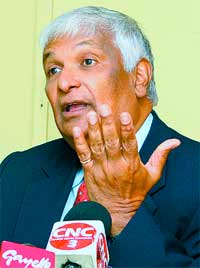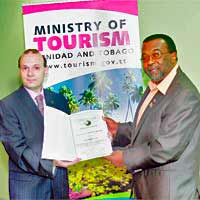Trinidad & Tobago
T&T budget to spur growth

By Sandra Chouthi
Special to Indo Caribbean World
Port-of-Spain - While economic uncertainty hangs over the Eurozone and the US appears to be slowly moving out of recession, Trinidad and Tobago's 2012 (TT) $54.6 budget is focused on transforming a stagnant economy.
Gross domestic product growth in Trinidad and Tobago for 2011 was almost zero. The economy is still in the doldrums largely over funds that remain unsettled in failed Colonial Life Insurance Company — the cash cow subsidiary of the Lawrence Duprey-built empire CL Financial.
The People's Partnership government has taken on the challenge of settling the issue where Clico policyholders are demanding a full return of their funds. This is so despite Finance Minister Winston Dookeran saying on October 12 that his government is under no legal obligation to so do.
In the October 10 budget, Dookeran said the Ministry of Finance will establish an entity for Clico policyholders' government-issued bonds. These instruments would qualify as an investment note into a Clico Trust Fund to be traded on the Trinidad and Tobago Stock Exchange, he said.
Policyholders would be given the option of re-investing their bonds, with maturities of years 11-20 in what is known as NEL2.
"This instrument will be equal to the face value of their bonds at the date of exchange and would be significantly greater in value than the value of the bonds in the open market," he said.
Dookeran said the means of exchange of the bonds and any potential risks associated with this market-based instrument will be properly explained to investors through a sustained communication plan.
"Upon completion of the process of exchanging the bonds for units, the (Clico) Trust (Fund) would be listed on the Trinidad and Tobago Stock Exchange and units in the Trust can be traded within the trading structure of the domestic capital market, similar to the other closed end trusts or funds which are currently listed on the exchange," he said.
Speaking at a Ministry of Finance post-budget discussion on October 12 — the day after he delivered his second budget — Dookeran said had the government decided to pay off Clico depositors in one single payment, it would have cost (TT) $19 billion. Dookeran said Trinidad and Tobago's annual revenue is an estimated $42 billion. The government's wage bill alone is $8 billion.
This budget — the largest ever — is pegged on an oil price of (US) $75 a barrel and a natural gas price of $2.75 per mmbtu. Last year's budget was based on an oil price of (US) $65 and natural gas of $2.75.
This coming year's budget will be the third year that the Trinidad and Tobago economy will be in deficit: this time to the sum of (TT) $7.6 billion.
Just prior to the budget, the government went to Parliament to raise Trinidad and Tobago's debt ceiling from $38 billion to $70 billion.
According to the September 2011 Republic Economic Newsletter, a publication of Republic Bank Ltd, among the issues raised in the debate were the use to which funds were going to be put, whether the country's debt was already too high, whether the country would be able to repay the debt and the magnitude of the increase in the ceiling of $32 billion. The bank's position was that once certain principles are followed, debt can be beneficial.
The debt ceiling refers to the maximum level of new debt that a country is legally permitted to incur. It is separate and apart from the country's stock of outstanding debt at any time. The country's debt is separate and apart from the country's stock of outstanding debt at any point in time. This country's debt ceiling was raised from an initial limit of $13.1 billion sometime prior to 2003 to $70 billion in 2011.
In his opening budget statement, Dookeran, who has taken much criticism for being slow to move on reviving the economy, said this was a transformative budget.
In other words, the deficit is necessary to spur development and investment.
Another important factor about the 2012 budget is that it was delivered against a backdrop of the government having declared a State of Emergency since August 22, 2011. The curfew was originally set at 9 pm to 5 am, but has since been changed to 11 pm to 4 am.
The police and courts have been very strict with curfew breakers, with several people having been fined or jailed after being caught outside after 11 pm.
It was initially for a two-week period, but then the government went to Parliament, and got a three-month extension by virtue of its 29:12 majority in the Lower House.
The state of emergency was called to treat with a spiraling crime rate — gang- and drug-related murders in particular. Prime Minister Kamla Persad-Bissessar said the murder rate is so far down by 70 percent.

Port-of-Spain – Trinidad and Tobago has been voted the World's Best Tourist Destination for 2012 and has also been declared the Favourite Cultural Destination in 2012.
The announcement was made on October 9 when tourism organisations from 27 European Union member states voted unanimously during the Autumn Meeting of the European Union Council on Tourism and Trade in Bucharest, Romania.
The designation of the World's Best Tourist Destination is the highest honour to be awarded for a country's achievements in tourism.
A four-member team from the European Council, led by the Minister of Energy of Romania and the Council Vice-President, arrived in Trinidad last Saturday to present the award to the Government and People of Trinidad and Tobago.
In a statement, Minister of Tourism, Dr Rupert Griffith, said he received the news on October 10. "We are, actually, the first country in the Western Hemisphere to receive such an award," Griffith said.
"I was also honoured and humbled to be inducted (on Sunday) as an honorary member of the European Union Tourism Academy. All of this augurs well for Trinidad and Tobago as we strive to brand Trinidad and Tobago as a premier destination in the Caribbean region."
The Best Tourist Destination award is offered to countries that have complied with the United Nations Tourism Division, UNESCO and the European Union on Tourism and Trade's principles "on fair tourism, ethical tourism and safety standards and the historic preservation of cultural sites".
On the debate for the award, Dr Anton Caragea, president of the European Union Council on Tourism and Trade (EUCTT), presented a report titled: "Trinidad and Tobago — A Success Story in Tourism".
Among the reasons for the award of World's Best Tourist Destination for 2012 to Trinidad and Tobago, Caragea highlighted the respect for cultural patrimony and traditions "in offering to tourists a possibility to participate in impressive paraphernalia festivals such as Holi, Hosay, Divali, Corpus Christi, Eid-ul-Fitr, Tobago Heritage Festival, Tobago Fest and Trinidad's greatest show on earth (Carnival)".
Trinidad and Tobago's dedication to the protection of the environment, especially along the east coast, the wetlands, beaches and ecological and geographical biodiversity was also hailed.
Caragea also praised the range of activities which include wildlife photography in places such as El Tucuche Reserve, Valencia Wildlife Sanctuary, Caroni Bird Sanctuary, cave exploration at Gasparee Caves, cycling and hiking at Argyle Waterfall and kayaking at Paria Bay and Tobago.
The EUCTT was established in 2005 and its member countries include Austria, Belgium, Bulgaria, Cyprus, Czech Republic, Denmark, Estonia, Finland, France, Germany, Greece, Hungary, Ireland, Italy, Latvia, Spain and Sweden among others.
The award has previously been presented to Syria in 2007, Turkey in 2008, United Arab Emirates in 2009 and the Republic of Korea (South Korea) in 2010.